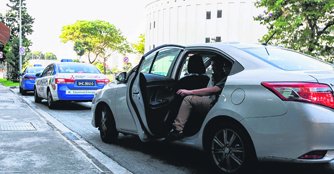Taxis and private-hire cars can have inward-facing video cameras from 22nd June
22 May 2018|2,834 views
Taxis and private-hire cars can be equipped with inward-facing video cameras from 22nd June, when new guidelines governing their installation and use kick in. The in-vehicle recording devices - to tackle fare evasion and abuse of drivers - will however only capture video footage without audio, so passengers' conversations are not recorded.
Vehicles that have these inward-facing cameras must also display notices informing commuters of them, and if the taxis or private-hire cars are booked in advance, ride-hailing apps or cab companies must also alert customers that the car they are dispatching is equipped with these devices.
These are among a slew of rules released by the Land Transport Authority (LTA) on Tuesday (22nd May). They follow on from advisory guidelines published by the Singapore's privacy watchdog, the Personal Data Protection Commission (PDPC), last month, regarding in-vehicle recording by transport service providers.
Since 2015, the National Taxi Association has been lobbying for the use of inward-facing to deter fare cheats and unruly passengers. While there have been no rules prohibiting their use, privacy laws have created some uncertainty.
In 2013, the island's largest taxi firm, ComfortDelGro, installed inward-facing cameras in the mobile data terminals in its taxis, but the company has since removed all of them. The other four cab companies - TransCab, SMRT, Prime and Premier - do not have such cameras in their fleets.
The LTA's new set of guidelines provide cab operators and private-hire car fleet owners with greater clarity on the use of in-vehicle recording devices.

"This is to ensure that the inward-facing in-vehicle recording devices (IVRDs) are installed according to the manufacturer's requirements and LTA's requirements, and to prevent the inward-facing IVRDs from being tampered with," the LTA said.
The centres must ensure the cameras are secured, and the data contained cannot be downloaded or accessed without authorisation - such as by locking the memory card slot. Video footage can also only be retained for a maximum of seven days.
The inward-facing cameras must also be installed in a fixed position, so it cannot be rotated in order to capture compromising video footage of passengers. Fleet owners are also required to carry out regular checks on their vehicles, to ensure the recording devices have not been tampered with.
Drivers themselves may also choose to install such cameras, but they need to obtain permission from the LTA. Under the law, persons found guilty of flouting the LTA's rules can be fined up to $1,000, imprisoned up to three months, or both.
Taxis and private-hire cars can be equipped with inward-facing video cameras from 22nd June, when new guidelines governing their installation and use kick in. The in-vehicle recording devices - to tackle fare evasion and abuse of drivers - will however only capture video footage without audio, so passengers' conversations are not recorded.
Vehicles that have these inward-facing cameras must also display notices informing commuters of them, and if the taxis or private-hire cars are booked in advance, ride-hailing apps or cab companies must also alert customers that the car they are dispatching is equipped with these devices.
These are among a slew of rules released by the Land Transport Authority (LTA) on Tuesday (22nd May). They follow on from advisory guidelines published by the Singapore's privacy watchdog, the Personal Data Protection Commission (PDPC), last month, regarding in-vehicle recording by transport service providers.
Since 2015, the National Taxi Association has been lobbying for the use of inward-facing to deter fare cheats and unruly passengers. While there have been no rules prohibiting their use, privacy laws have created some uncertainty.
In 2013, the island's largest taxi firm, ComfortDelGro, installed inward-facing cameras in the mobile data terminals in its taxis, but the company has since removed all of them. The other four cab companies - TransCab, SMRT, Prime and Premier - do not have such cameras in their fleets.
The LTA's new set of guidelines provide cab operators and private-hire car fleet owners with greater clarity on the use of in-vehicle recording devices.

Although the guidelines appear to be in favour of drivers, they also require transport service companies and drivers to abide by the Personal Data Protection Act
"This is to ensure that the inward-facing in-vehicle recording devices (IVRDs) are installed according to the manufacturer's requirements and LTA's requirements, and to prevent the inward-facing IVRDs from being tampered with," the LTA said.
The centres must ensure the cameras are secured, and the data contained cannot be downloaded or accessed without authorisation - such as by locking the memory card slot. Video footage can also only be retained for a maximum of seven days.
The inward-facing cameras must also be installed in a fixed position, so it cannot be rotated in order to capture compromising video footage of passengers. Fleet owners are also required to carry out regular checks on their vehicles, to ensure the recording devices have not been tampered with.
Drivers themselves may also choose to install such cameras, but they need to obtain permission from the LTA. Under the law, persons found guilty of flouting the LTA's rules can be fined up to $1,000, imprisoned up to three months, or both.
Latest COE Prices
February 2026 | 2nd BIDDING
NEXT TENDER: 04 Mar 2026
CAT A$106,501
CAT B$105,001
CAT C$74,999
CAT E$112,890
View Full Results Thank You For Your Subscription.




















